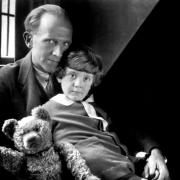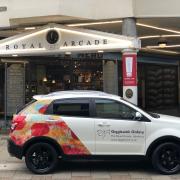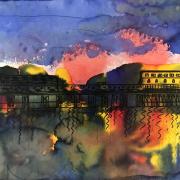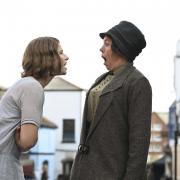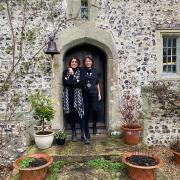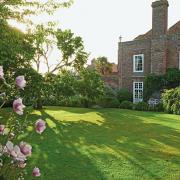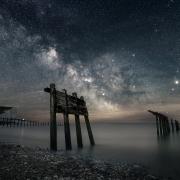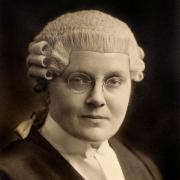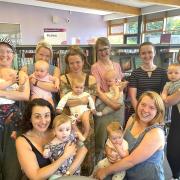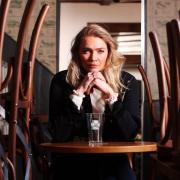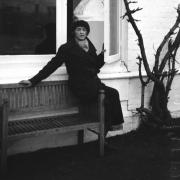In her latest crime thriller best-selling author Jacqueline Winspear draws on an East Sussex story she first discovered as an 11-year-old
Oprah Winfrey and Hillary Clinton are among the high-profile fans of Jacqueline Winspear's fictional psychologist and detective Maisie Dobbs.
Each new instalment of Jacqueline's 15-strong series, which is set in the inter-war period, has featured in the New York Times' top ten bestseller list. The total series has enjoyed UK sales of more than 200,000.
But although Jacqueline has lived in Marin County, California, for the past 28 years, her time spent living in East Sussex and Kent permeates all her novels - not least her latest The American Agent, which draws in part on a story she first uncovered in East Grinstead as an 11-year-old.
"Sussex is where my roots are," says 63-year-old Jacqueline down the phone line from London, fighting off the jet lag having returned from California the night before. "I love coming back - my friends and family are here. I used to live in Hastings Old Town - my parents lived in Sussex for almost 35 years, first of all in a bungalow in Three Oaks, and after my dad died my mum moved to Icklesham. I adore Rye - I set part of my novel To Die But Once there, and other earlier books in Hastings."
The American Agent follows Maisie through the London Blitz, where she spends her nights on the ambulance crews helping those injured in the bombings, and her days investigating the death of a young US radio journalist, Catherine Saxon, who is bringing Londoners' daily struggles to American households. The book is liberally sprinkled with quotes from Edward R Murrow's contemporary radio reports from the bowels of the BBC, where he tried to encourage a nation wary of entering another European war to throw in their lot behind the UK. "Ed's broadcasts are revered," says Jacqueline. "He would put a microphone next to the street to capture the sound of people running into shelters before the bombs fell." Not so long before this point BBC announcers had been reading the news while wearing dinner jackets. Journalists like Edward were bringing the reality of war to people's front rooms.
"It was like a softer propaganda," says Jacqueline. "Nobody wanted to go to war again. Roosevelt had to be careful as there was an election happening."
It is a storyline surrounding Maisie's old friend Priscilla which brings East Grinstead into the new novel. Pris receives a series of nasty injuries as she tries to rescue children from a burning building. She is taken to the Queen Victoria Hospital, where pioneer surgeon Archibald McIndoe is working with airmen who have received catastrophic burns to develop the plastic surgery techniques still in use today. Jacqueline first came across McIndoe's story as an 11-year-old while her seven-year-old brother was in hospital for surgery. "I saw a plaque to him and marched around asking questions about who he was," remembers Jacqueline. "I always knew I would weave it in there somewhere. It was stunning what he managed to do - he didn't expect the airmen who had suffered wounds to stay in and wear their uniforms. After they recovered they would go back to work, and come in again and again for the next round of operations. During their recovery time rather than stay in hospital they could go to the pub - East Grinstead itself was integral to their healing. No-one looked twice, it was a collaborative healing process. As a kid I found it a wonderful story."
It was a recovery process of her own which led Jacqueline to start writing the Maisie Dobbs series. She had started writing her initial ideas back in 2000, but found her time was being taken up by a new job. An horrific riding accident smashed up her right arm and left her in recovery for six months. "After a few weeks I decided I was never going to go back to that job again," recalls Jacqueline. "One of my friends said to me it was now time to finish my novel. She told me: 'You've got a left hand'."
She knuckled down and wrote the whole book with her left hand, as her right arm recovered. She was unfortunate in that 9/11 struck the month after she finished the book, so it wasn't until 2003 that Maisie Dobbs saw the light of day, to critical and commercial acclaim including the Agatha Award for Best First Novel.
"When the book went into production the editor asked me about the next one," remembers Jacqueline. "I had to tap dance - I had a few vague thoughts but nothing concrete. I put them on my computer as fragments - and then realised I had ideas for about six more books."
Maisie is a character who is able to float between different stations in life. In the original book her backstory is of a teenage housemaid who is taught the ways of psychology and detection by investigator Maurice Blanche.
Gradually she finds her way into an aristocratic world, going on to study at Girton College, Cambridge before volunteering to serve as a nurse in World War I. The first novel begins as she sets up her own investigation business in 1929, and over the course of the series finds herself falling in and out of love across war-torn Europe and becoming a surrogate mother to young evacuee Anna.
The inspiration for Maisie's Kent home, Chelstone Manor, is based in part on Jacqueline's memories of Pashley Manor, near Ticehurst. "I wanted to craft the stories and not just write a mystery series," says Jacqueline. "I wanted there to be an arc to the stories which moved through time with the same cast of characters. The mystery runs through the book which ends in a resolution, but sometimes for the individual characters a resolution goes over two or three books. All my characters have lived through one war - I wanted them to see the next war looming. My grandfather was shellshocked, gassed and suffered serious leg wounds in the Battle of the Somme - how did he feel when he saw my dad in his uniform for World War II?"
She feels her novels may have touched a nerve with the American public through a lack of awareness about World War I in their history - despite double the number of servicemen dying in the so-called Great War than in Vietnam.
"My readers in the US have said that reading my books has made them go back over their family history," says Jacqueline.
Historical research is key to Jacqueline's process, from ensuring she uses the correct English vocal inflections which her grandmother might have used in the 1930s and 1940s to visiting the Imperial War Museum, Beacon Hill in Boston and the battlefields of the Somme and Ypres to keep her work accurate. In The American Agent she also touches on the Eagle squadrons of US pilots fighting with the RAF, frequently joining the Canadian airforce in the hope of flying a Spitfire.
As for the future she is working on a new Maisie Dobbs book, and an American-only release What Would Maisie Do? which relates readers' favourite quotes and stories from the series. She won't be drawn on whether Maisie could pop up in TV or film soon.
At present she's just going back into her usual work routine - writing from 8.30am to lunchtime, practising dressage on her horse in the afternoon, then returning to work for two hours after a cup of tea and slice of toast with Marmite. "I immerse myself in the country of my birth," she admits. "Obviously it's a different time, but there's probably a comfort to that. I'm going to a place I know."
The American Agent, number 15 in the bestselling Maisie Dobbs series, by Jacqueline Winspear is out now and published by Allison & Busby. Hardback costs £19.99.
More…
- MasterChef winner Kenny Tutt ahead of his new restaurant opening in Worthing - LLast year's MasterChef winner Kenny Tutt is set to open his first restaurant in his home town of Worthing



